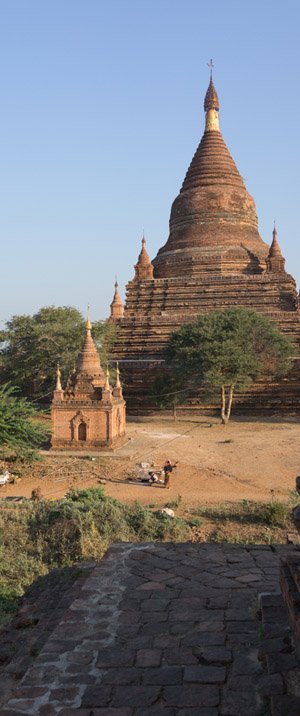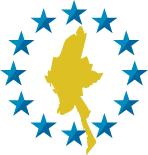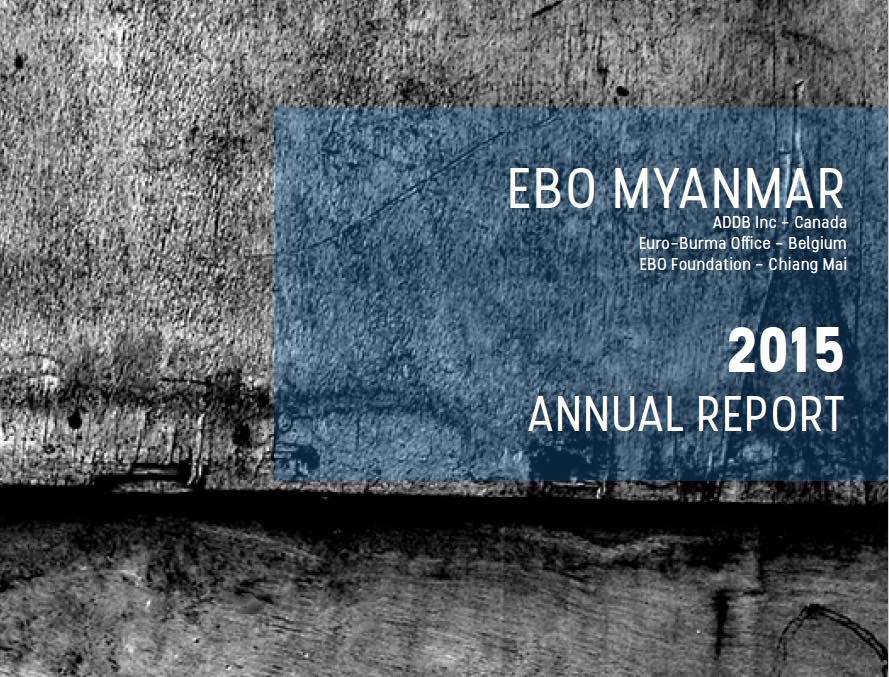Activities
EBO 2015 Annual Report: 1-page view / 2-page view
2013 EBO Annual Report [English] [Burmese]
partners
EBO mainly works with:
- Decision makers: Government / Members of Parliament & Parliamentary peace committees/ Political Parties/ Community leaders
- Ethnic Armed Groups (EAOs): Ethnic organizations engaged in armed struggle to achieve a political objective.
- Civil Society Organizations (CSOs): Grassroots and civil society organizations (CBOs & CSOs)/ 88 Generation/ Media organizations/ groups “left out” of the ongoing political process and power configuration in Myanmar: women, youth, ethnic, religious and other disenfranchised communities from Myanmar.
- International Community: Foreign Governments/ International agencies/ Research organizations/ INGOs.
ebo outcome statement
EBO plans to achieve the following goals with each boundary partner:
- Decision makers participate in capacity building (trainings & workshops) and dialogue processes to increase their capacity to interact with the public and stakeholders, to seek their opinions and share knowledge about democratic principles, human rights and rule of law. They gain the capacity to develop policies in consultation with each other, the public and stakeholders, to implement a political solution to achieve peace and democracy.
- Ethnic Armed Organizations (EAOs) participate in trainings and consultations that strengthen their capacity to reach a common position amongst themselves concerning the nationwide ceasefire and political dialogue and to negotiate and implements their agreements with the government. EAOs have the capacity to interact with the general public and political parties strengthening collaboration and cooperation in support of a position to negotiate and implement agreements with the government.
- Civil Society Organizations (CSOs), through participation in trainings and consultations, have the necessary skills and knowledge to sensitize the public on the peace and democratization processes. They will support the public in expressing their own opinions and interests to be raised with decision-makers and EAOs. CSOs organize workshops, trainings, and consultations with the public and decision-makers/EAOs on emerging issues related to policies, laws, and the peace process. CSOs seek out and share knowledge, processes and experiences with other CSOs to strengthen civil society, especially women and youth. Media organizations participate in capacity building trainings and have the adequate skills and necessary equipment to provide timely and accurate information to the public helping them better understand the peace, democratic and social transformation processes.
- The International Community, foreign governments and INGOs will seek out and use information provided by EBO to develop their policies to support the democratization and peace process and to coordinate their responses and involvement.
ebo programme summary
1990 - 2000 highlights:
- International advocacy for democracy in Myanmar (Campaign to make Aung San Suu Kyi a democracy icon and household word),
- Advocacy for inclusion of ethnic rights in the campaign for democracy – UNGA resolution for tripartite dialogue,
- Advocacy for human rights and gender equality to be recognized by the democracy movement,
- Advocacy for the recognition and acceptance of Rohingya and other minorities.
2001 – 2010 highlights:
- Initiative for National Reconciliation Programme (NRP),
- Initiative for state-based structures (state and federal constitution drafting processes),
- Initiative for inclusion of civil society and political parties (ENC) in the democracy movement,
- Capacity building of civilian activists – youth, women, and disenfranchised communities.
2011 – 2020 highlights:
- Facilitating peace talks between the Government of Myanmar and 20 EAOs,
- Maintaining bilateral ceasefires through 32 Liaison Offices of 10 EAOs,
- Initiative for inclusion of civil society and political parties (ENC) in the democracy movement,
- Capacity building of civilian activists – youth, women, and disenfranchised communities.
2021 – 2025 highlights:
- Preserving democratic assets – political parties, civil society and community cohesion,
- Strengthening state-based dialogue and coordinating platforms – political and humanitarian,
- Maintaining peace infrastructures – Liaison Offices of EAOs to protect civilians (IDPs and political refugees),
- Facilitating talks amongst democracy advocates on the process of political transformation,
- International advocacy for democracy in Myanmar,
- Creating knowledge and understanding of federalism and constitutional processes – states, regions, and national, within the democracy movement.
2023 - 2025 priorities
- Preserving democratic assets – survival of civil society, political actors, communities and meaningful participation in the political process
- Facilitating talks amongst democracy advocates on finding a political solution to the crisis
- Creating knowledge, capacity and understanding of federalism, the rule of law, and constitutional processes to enable actors to utilize them in finding a political solution.
2023 - 2025 programme
Objective 1 – Strengthening Democratic Resilience (to preserve democratic assets)
|
Approaches: 1. Local peace mechanism for civilian protection and humanitarian support, 2. Internal consultation and consensus building, 3. International Advocacy. |
EBO Partners/Activities: 1. Seven EROs/EAOs (25 Liaison Offices, 2. Facilitation of internal consultations (K3C, etc.) & coordination of actors, 3. Advocacy – ASEAN and Neighboring Countries, 4. IPSG – INGO info-sharing & coordination, and Yangon diplomatic briefings. |
Objective 3 – Helping actors to Prepare for Future Change Processes
|
Approaches: 1. Supporting constitution drafting processes in the States, and Regions, 2. Joint knowledge creation on federal arrangements and the monitoring of human rights violations and their protection, 3. Build capacity of change agents for future political development. |
EBO Partners/Activities: 1. Weekly Lectures, 2. Inter and intra coordination of State constitution drafting processes (SCCB), 3. Resource Organizations, 4. Women Leadership Program, 5. Federalism Training Courses – Basic and Thematic, 6. Strengthening Federalism knowledge of partners. |
Objective 4 – Strengthening EBO Organizational Capacity
|
Approaches: 1. Promoting inclusivity –gender, disabilities, and the disenfranchised. 2. Joint knowledge creation on conflict sensitivity, adaptive management and psycho-social impacts, 3. Build capacity of staff to implement policies. |
EBO Partners/Activities: 1. Creating awareness, 2. Staff workshops, 3. Staff training, 4. Update policies and practices, 5. Implementing policies. |
cross-cutting theme:
gender mainstreaming:
- Intergrating a gender equalty perspective
conflict sensitive practices:
- Regular analyses
- Better documentation
- Infornation dissemination
inclusion:
- Recruitmentt
- Geographical distribution
- Awareness
psycho-social impact:
- Awareness
- Recognition
- Training
10-year report of EBO's activities: Euro-Burma Office: Working to promote democracy in Burma - Report on over a Decade of Activities
Work areas:

|
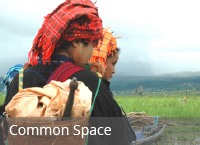
|

|
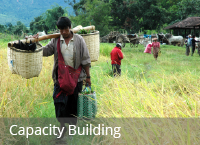
|
